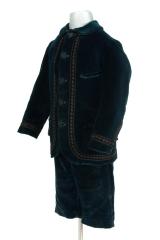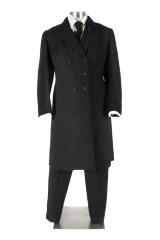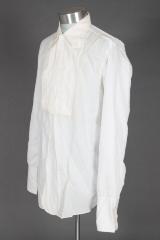Comments and Tags
Be the first to comment on this item!
Voigt Family Collection
Clothing and Accessories
Men's Clothing ➔ Tuxedo
Identifier:
V1186a-cDescription:
This three-piece wool tuxedo consists of a tailcoat, a vest, and trousers. The tailcoat has wide peak satin lapels, a breast pocket, and a single vent on the back. It also has two-button cuffs and a label at the interior neck that reads "The Arthur M. Rosenberg Co., New York, New Haven". There is also a label on the inside of the interior pocket that verifies this tuxedo belonged to Ralph Voigt of Grand Rapids, Michigan. The vest has a satin shawl lapel and 4 buttons down the front. It has an interior label that reads "Mackenzie, Bostock, Monroe & Co.". The trousers are uncuffed and feature a solid silk stripe down the side. The also have a label from Arthur M. Rosenberg Company.This tuxedo is photographed with tie number V2017.1.515 and shirt number V1419.8
Date:
October 1947Materials:
Wool, Silk, Satin, Cotton Sateen, Fille TafettaDimensions:
43.5" h 41.2500 | 20 | 18" w 24.5" d; 45" hCurrent Location Status:
In StorageCollection Tier:
Tier 2Source:
Gift of Kent County Council for Historic PreservationRelated Entities:
Arthur M. Rosenberg Company (creator)Arthur M. Rosenberg Company was established in 1898 in New Haven. They also produced suits in New York in the 1920s. They were one of the top tailors in the New Haven area and the business saw much success due to the close proximity to Yale. Students began spending less money on clothing and the company suffered. They closed their doors around the 1980s. Mackenzie, Bostock, Monroe Company (sold by)
Mackenzie, Bostock, Monroe Company was a retailer based on Monroe Ave in Grand Rapids. Early records show the company was in operation as early as 1912 and was registered in Grand Rapids until at least 1986. They were known for their quality clothing, neckties, menswear, hats, and furniture. The original President was C.W. Monroe, the Vice President was M.W. Mackenzie, and the Secretary and Treasurer was F. G. Bostak. Voigt House (used by)
Alternate names: Voigt Family
The Voigt family, whose home is now preserved by the Grand Rapids Public Museum, moved to the city in 1875 and resided at 133 Court Street (now Scribner Street). The Voigt family partnered with the Herpolsheimer family in the dry-good and carpet business and in a few years the partnership expanded to include two flour mills -- the Crescent and Star mills located on the Grand River. In 1902 the partnership came to a mutual end. The Herpolsheimer family retained the dry-good store and the Voigt family kept the two mills. By the turn of the century, Voigt flour under several brand names, and later Voigt Cereal, were known across Michigan and far east as New England. Due to bankruptcy and a strike, the flour milling business came to an abrupt end in 1955. In 1895, Carl G.A. Voigt hired local architect William G. Robinson to design a house on 115 College Avenue Southeast to serve as his retirement home. It was modeled after the chateaux at Chenoceaux, France. The home is a fine example of Victorian architecture and complemented the Victorian family that lived in it. It was lived in by just the Voigt family which was comprised of Carl Gustav Adolf Voigt, his wife Elizabeth Wurster Voigt and their children. They were the parents of nine children with six surviving until adulthood. The family lived in the home from 1895 to 1971. Kent County Council for Historic Preservation (donor)
The Kent County Council for Historic Preservation has several responsibilities that support the preservation and protection of our history. These include:
- Recommending designation of new historic districts
- Reviewing applications for proposed alterations within historic districts
- Enforcing the Historic Preservation Ordinance Chapter and cooperating with the state, federal and local governments in pursuance of its responsibilities
- Conducting meetings or hearings necessary to carry out these purposes
The Historic Preservation Commission consists of seven members who reside in Grand Rapids. Members are appointed by the City Commission for three-year terms (two consecutive terms are allowed). Members shall have a demonstrated interest in or knowledge of historic preservation. Two members shall be appointed from a list submitted by the Kent County Council for Historic Preservation and one member shall be an architect duly registered in the State of Michigan.
http://grcity.us/design-and-development-services/Planning-Department/Pages/Historic-Preservation-Commission.aspx
Ralph Voigt, born in Grand Rapids, was 14 years old when the family moved into their home at 115 College Ave. SE in 1896. Mr. Voigt was well into middle age when Ralph was born, so it was only natural that the last child should be special to his father. Ralph, the third surviving son by the second marriage, became a pal to his father in his old age. Partly for this reason, Ralph entered and graduated from one of the finest Prep schools in the nation, Phillips Academy in Andover, Massachusetts. He subsequently went to Yale University graduating in 1905 from the School of Mining Engineering. During this period, he mastered the banjo and the guitar playing in school organized "bands" popular at the time. Joining a fraternity or sorority, of course, was a high point in the college student's career. Ralph was certainly no exception. He was in plays and college related productions and was popular. Memorabilia of Ralph's college days is abundant in the house -- a set of Wedgwood china bearing Yale scenes and other small personal items displayed in his bedroom. After his years in New England, Ralph returned to Grand Rapids and worked with the other family members in the milling business especially after his father's death in 1908. Ralph remained a bachelor living in this family home until his death there in 1971 at age 88.



